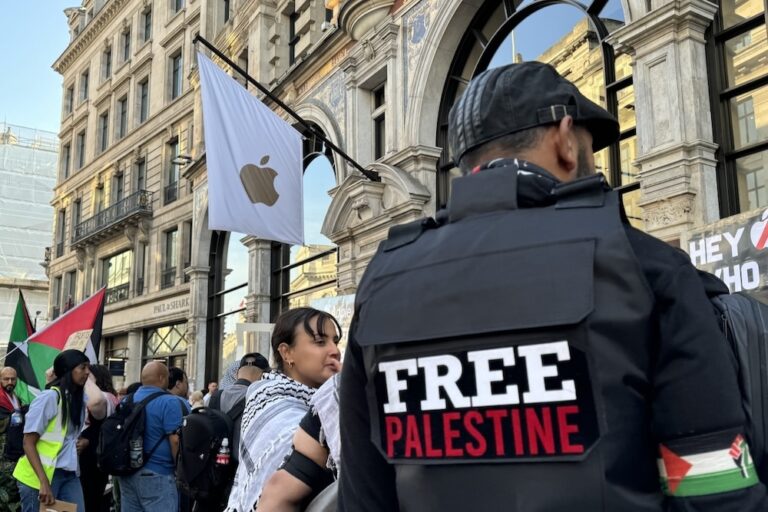(WAN/IFEX) – The following is a WAN press release: London, 22 November 2004 Press Freedom Under Siege World-Wide Journalists are being murdered and their publications attacked at an alarming rate. New government restrictions on freedom of expression have also contributed to the deterioration of press freedom in 2004, according to the World Association of Newspapers’ […]
(WAN/IFEX) – The following is a WAN press release:
London, 22 November 2004
Press Freedom Under Siege World-Wide
Journalists are being murdered and their publications attacked at an alarming rate. New government restrictions on freedom of expression have also contributed to the deterioration of press freedom in 2004, according to the World Association of Newspapers’ half-year review of press freedom world-wide.
Thirty-five journalists have been killed in the past six months and 63 so far this year, an increase from 53 for the whole of 2003. The war in Iraq, where seven journalists were killed in the second half of 2004 and 23 throughout the year, was a major reason the death toll in 2004 surpassed that of 2003. But Iraq was not alone: eight journalists have been murdered in the Philippines in the past six months, making it even deadlier for journalists than Iraq.
“National security laws, anti-terrorism laws and criminal defamation laws have landed scores of journalists in prison and resigned many more to practicing self-censorship,” said the report, delivered to the WAN Board, meeting in London. “130 journalists are currently in prison around the world, with Burma, China, Eritrea, Iran, Nepal and Vietnam having the highest number of journalists behind bars. The most blatant attempts to create legal barriers to stifle the press can be seen in, for example, Iran, Zimbabwe and Vietnam.”
The report is available on the WAN web site at http://www.wan-press.org/article5683.html.
Region by region, the report said:
– In Latin America, seven journalists were killed in the second half of the year, but none in Colombia, a country where more than 50 journalists have been killed over the past 10 years.
In Cuba, nearly 30 journalists remain imprisoned in appalling conditions since their arrests in March 2003. Despite numerous protests from the international community, only two of the journalists have been released, due to medical reasons.
In Brazil, a bill that seeks to control the exercise of the profession of journalism through the establishment of federal and regional journalism councils was sent to Congress. The bill was introduced by President Lula da Silva for debate in the Chamber of Deputies and the Senate.
– In Africa, press freedom issues remain a top priority for media, as draconian press laws continue to be the norm on the continent. At the same time, the lack of infrastructure and an economic vacuum are the biggest obstacles to development of independent media.
Sudan continues to have one of the most restrictive media environments on the continent. Authorities have imposed a virtual news blackout and denied international observers access to the country.
In Zimbabwe, freedom of the press continues to be limited under President Robert Mugabe. The 2002 Access to Information and Protection of Privacy Act continues to be used to muzzle what remains of the independent press in the country. Most recently, a new bill has been proposed to regulate non-governmental organisations and, if enacted, will further silence critics and deprive the public of its right to access information.
In a surprising turn of events, press freedom registered a marked improvement in Togo, known as one of the worst countries in which to practice journalism in Africa. In a bid to lift EU economic sanctions, President Eyadéma pledged to make 22 democratic reforms.
– In Asia, 15 journalists were murdered in six months, more than in any other region. A strong culture of impunity exists and the murderers are rarely brought to justice.
Burma’s military government continues to stifle criticism of any sort through the jailing of journalists, censorship and restrictive licensing laws.
In China, the government continues to crack down on all forms of criticism by media. Over 40 journalists and internet dissidents are known to be in prison. In the fall, the diplomacy magazine Strategy and Management and the widely used web forum Yitahutu were shut down.
Despite a relatively open and lively media environment in Indonesia, outdated criminal defamation laws continue to be used to punish journalists who criticise public figures.
– The press freedom situation has deteriorated in Russia, where journalists continue to be harassed, intimidated and pressured. In connection with the Beslan tragedy, several journalists were detained or prevented by authorities from covering the event.
Elsewhere in Europe, conditions for press freedom in Belarus remain dire. Although the constitution formally provides for freedom of speech, authorities remain extremely intolerant of criticism, often silencing opposition media with libel lawsuits, financial pressures, closures and suspensions, and the intimidation of journalists.
– In the Middle East and North Africa, the media in most countries remain under very strict government control.
In Iraq, journalists continue to work in an extremely dangerous climate, where almost every work assignment means risking one’s life. At least 35 journalists have been killed since the war started in March 2003.
In Iran, the government continues to stifle the free press in the country, and next year’s presidential elections will most likely worsen the situation. Weblogs, which over the last years have provided a unique opportunity for Iranians to express themselves freely, are now being targeted by the government.
The Paris-based WAN, the global organisation for the newspaper industry, defends and promotes press freedom world-wide. It represents 18,000 newspapers; its membership includes 72 national newspaper associations, individual newspaper executives in 102 countries, 13 news agencies and ten regional and world-wide press groups.


